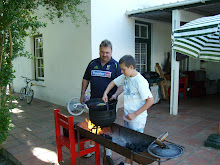Being able to lead other people toward common objectives is no different than any other discipline or skill both on and off the field.
* There is a self image tied into being a leader.
* What leaders see and imagine is different than what the average person visualizes
* Great leaders have to be keyed in to what's in it for everyone involved
* Great leaders have confidence they can lead and that others will follow.
* Great leaders do while others wait to be told what to do.
* Great leaders love teaching and solving problems.
* Great leaders learn not just from their mistakes but from every one's mistakes.
* To the greatest leaders, problems are nothing more than speed bumps on the way to their objectives.
* Great leaders aren't workaholics who don't take a break.
Great leaders enjoy the rewards from their victories and enjoy sharing their success with everyone around them.
* Great leaders have incredibly high standards... they do not settle for mediocrity.
Monday, July 28, 2008
Sunday, July 27, 2008
Getting it right!
The most common call heard next to the rugby field by coaches seems to be, 'I don't referee'. This might seem fair to outsiders, but in fact the lessons learnt by a school boys rugby coach refereeing not only his own team once in a while but other ages groups is the insight of what not to do, shout and comment about when watching other referees doing the thankless job.
I believe the coaches should referee and even allow their players to run with the whistle during training to show the hardships experienced in managing a game.
Let the parents come to a controlled training session and referee their own sons, with the aim of keeping the negative comments from the sideline to themselves in the future.
I believe the coaches should referee and even allow their players to run with the whistle during training to show the hardships experienced in managing a game.
Let the parents come to a controlled training session and referee their own sons, with the aim of keeping the negative comments from the sideline to themselves in the future.
Coaching our players to 'bite the bullet'
The incident between Bishops and Paarl this weekend reminds coaches of the responsibility we have for ensuring that discipline and team ethics are carried into our games no matter what the opposition. The past week saw numerous incidents at school boy level of players taking their frustrations out on the opponent. The coach should always remind the team that without an opponent their is no game.
Parents form a greater part of the games discipline than they realise. Comments, shouts and words of anger from the touchline insight the players to carry the moments of frustration out into violence. Should our local derbies be carried out without crowds and old boys?
Parents form a greater part of the games discipline than they realise. Comments, shouts and words of anger from the touchline insight the players to carry the moments of frustration out into violence. Should our local derbies be carried out without crowds and old boys?
Subscribe to:
Posts (Atom)
